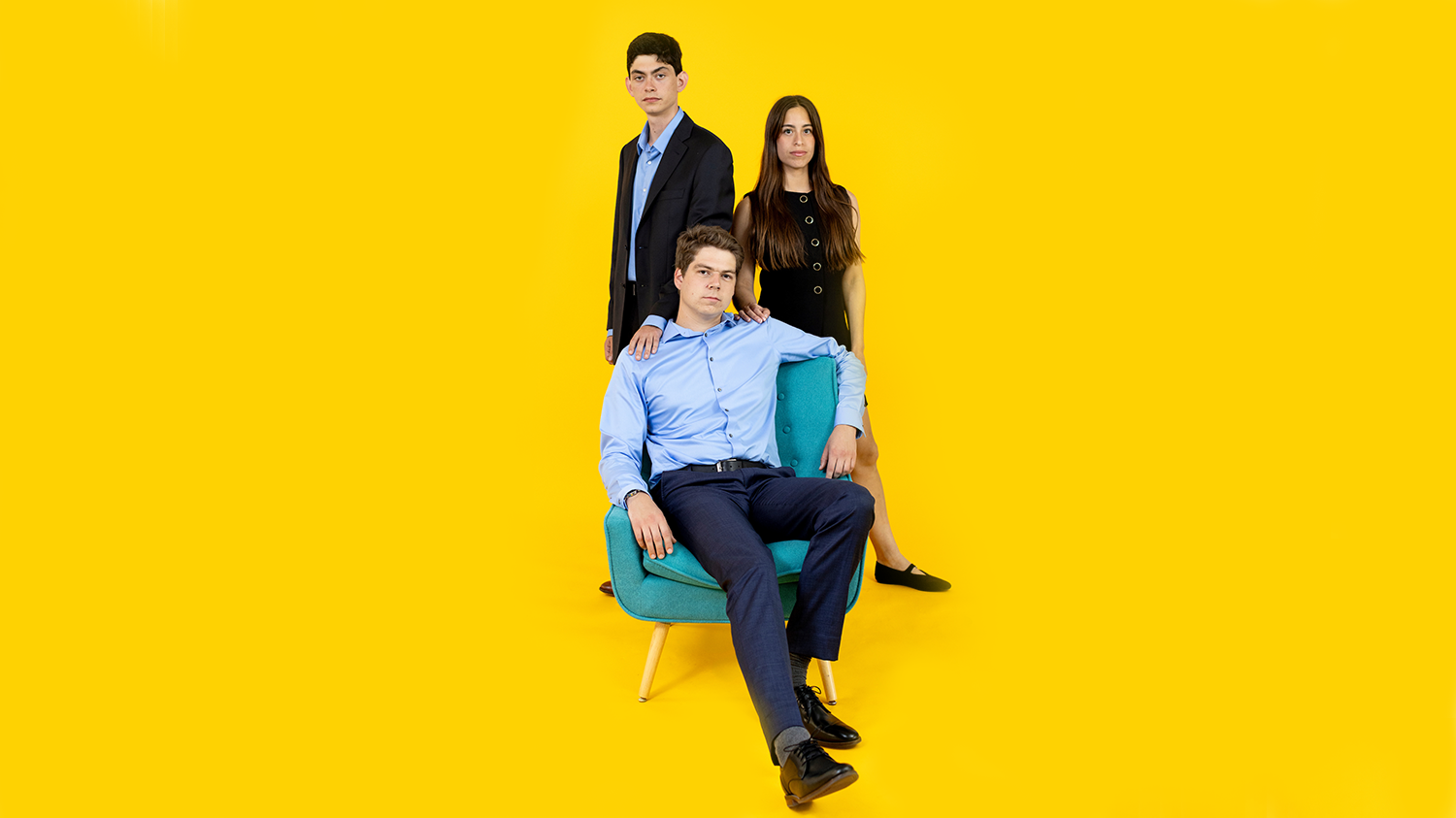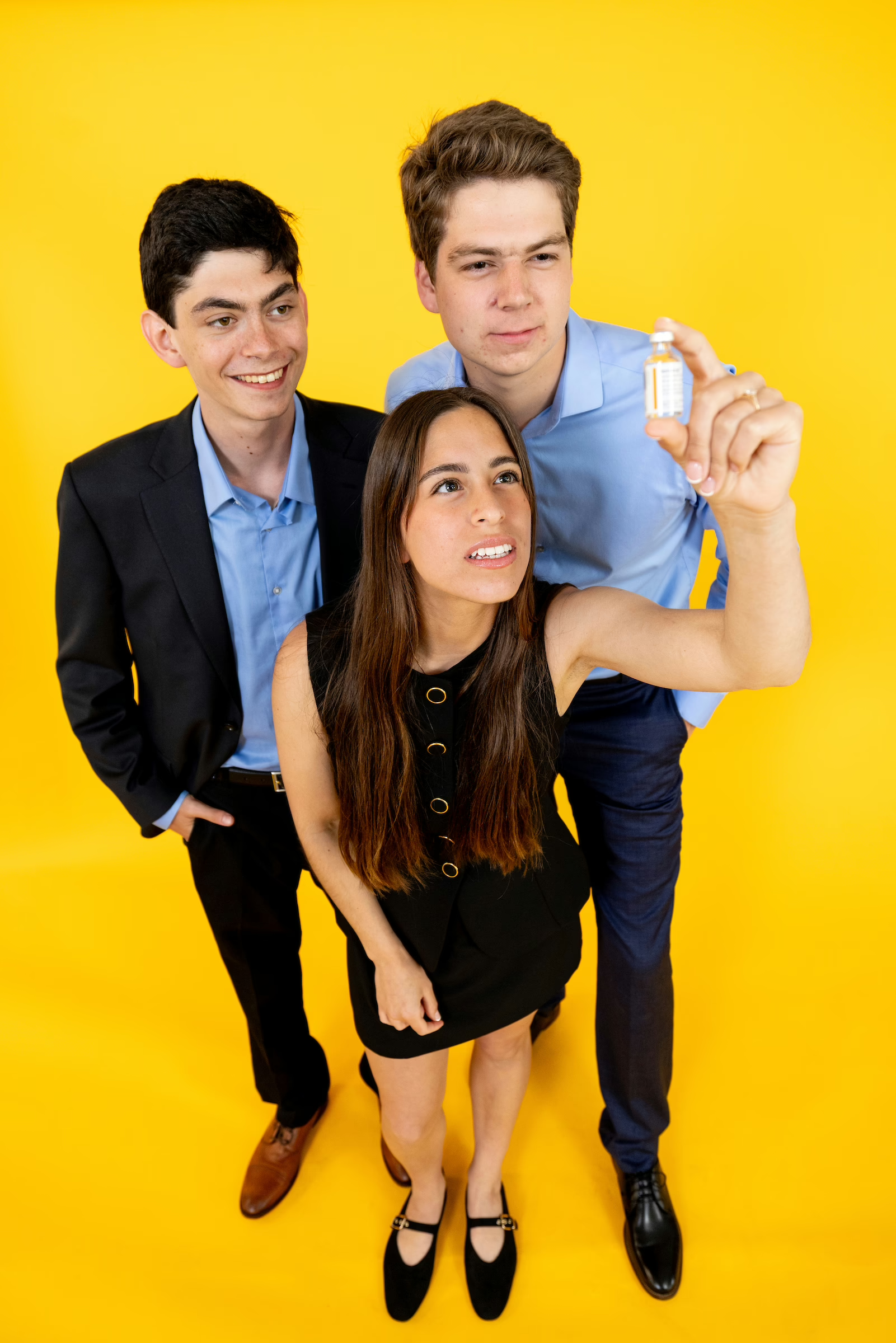Introducing Preserva Biotech, the Startup Bringing Confidence to Insulin Users

Oliver Haas (left), Micaela Moreira (right), and Ethan Vosburg (center) of Preserva Biotech pose for a portrait during Cal Poly’s CIE Accelerator photoshoot. Their startup aims to help diabetics with their insulin. (Photo: Ruby Wallau for CIE)
When Micaela Moreira found an unopened pack of insulin vials in the backseat of Ethan Vosburg’s brother’s car, she didn’t think much of it at first, and asked if she should put them in the fridge. Vosburg told her to throw them away.
The insulin had been sitting out too long. It might have been exposed to heat, and there was no way to know if it would still work.
For Moreira, who was studying bioengineering and biotechnology at UC San Diego at the time, that moment was shocking. A life-sustaining drug could go bad, and there was absolutely no way to tell.
As part of their entrepreneurial senior project class, electrical engineering masters student Vosburg and business administration graduate Oliver Haas dove deep into the problem, conducting research and interviewing over 40 individuals living with diabetes. They consulted endocrinologists and clinicians, hearing story after story of people who had unknowingly used compromised insulin, resulting in blood sugar spikes, hospitalizations or worse.
The more they learned, the clearer it became: there was a widespread problem that had no clear solution.
This sparked the idea for Preserva Biotech, a startup on a mission to help insulin-dependent diabetics through developing a portable, handheld device that determines whether insulin is still effective.

The Preserva Biotech team hopes to help diabetes patients with a device that lets them know if their insulin is still effective. (Photo: Ruby Wallau for CIE)
“Insulin is a hormone that your pancreas naturally produces to help your body regulate blood sugar. But, for people with diabetes, their pancreas doesn’t work properly to produce enough insulin, so they take outside sources of insulin to help them regulate their blood sugar, which is where we come in,” said CEO Haas.
If insulin is exposed to too much heat or time outside refrigeration, it begins to degrade, causing it to be ineffective. Preserva’s device aims to detect that change, giving patients real-time assurance that their insulin is still safe to use.
“Right now, there is no way to make an educated decision on whether insulin is safe to inject or not,” said CTO Vosburg. “They’re operating based on trust or guesswork, and that’s incredibly risky.”
That’s when they began working with Moreira. Her research experience at UC San Diego’s Ernst Lab, where she focused on protein engineering, purification and detection technologies, made her the perfect person to help design a solution that could identify denatured insulin. With her skills and desire to help people, she quickly became an essential part of the founding team.
“The UCSD Ernst Lab is a basic structural biology lab that I joined and they’ve been fundamental for me. They taught me everything that I know,” Moreira said. “They let me work on my experiments and learn from my mistakes. They’ve been super supportive and it’s been a great experience.”
Preserva Biotech first brought their idea to CIE’s Innovation Quest (iQ), a high-stakes competition where Cal Poly students pitch their innovative business ideas and prototypes to a panel of judges in hopes of winning thousands to fund their startup.
The team took home the Biotech Innovation Award sponsored by Leslie and Brett Eldridge of $5,000, validating the urgent need for their solution and giving them the momentum to keep going.
That win led them to apply for the CIE’s Summer Accelerator, an intensive 12-week program that provides Cal Poly students and recent graduates with the resources necessary to turn their innovative ideas into full-fledged startups. Participants in the Accelerator receive $10,000 in seed funding, as well as access to expert mentorship, entrepreneurial workshops and a dedicated workspace in the HotHouse, the CIE’s office located in downtown San Luis Obispo.
“We want to eliminate that added worry people have about their insulin and be able to have more stress-free lives.”
Oliver Haas
Preserva’s device aims to analyze the structural integrity of insulin. Because insulin is a protein, its effectiveness depends on maintaining a specific shape. When exposed to heat, time or agitation, it can denature, changing its structure and losing its ability to regulate blood sugar. The team’s device uses non-destructive methods to analyze the conformation—or shape—of insulin. By measuring how much of the insulin retains its correct shape, the device provides users with valuable insight into the medication’s effectiveness, eliminating the need to guess or test compromised insulin on themselves.
Haas, who previously worked at the CIE as a student programs coordinator, had spent time supporting other student founders and learning the ins and outs of entrepreneurship. Now, he is on the other side, building a startup of his own.
“I would say it’s a completely different job—now I’m working for myself and on my own business,” Haas said. “When I was working at the CIE, it definitely prepared me to understand what goes into a pitch deck and what teams need to focus on throughout the summer to be ready for investment. It also gave me a good understanding of the resources available and how important it is for the Accelerator cohort to lean on each other and learn from one another.”
Vosburg emphasized the global potential of their technology, noting that while insulin degradation is a concern in the U.S., it poses an even greater risk in low-to middle-income countries with limited cold-chain infrastructure. The team hopes their device can help bridge that gap, offering a low-cost, accessible solution to improve diabetes care in underserved regions.
The team aims to finalize their prototype and begin seeking investment by the end of the summer, with plans to pursue FDA approval, secure intellectual property protections and move toward manufacturing by 2027.
“We want to reduce the stress and medical burnout that people with diabetes experience,” Haas said. “We want to eliminate that added worry people have about their insulin and be able to have more stress-free lives.”
Watch Preserva Biotech and our six other Accelerator startups pitch live at Demo Day here.
By supporting the Center for Innovation and Entrepreneurship, you provide students and recent graduates with the tools, mentorship and financial resources needed to have a positive impact on society.
